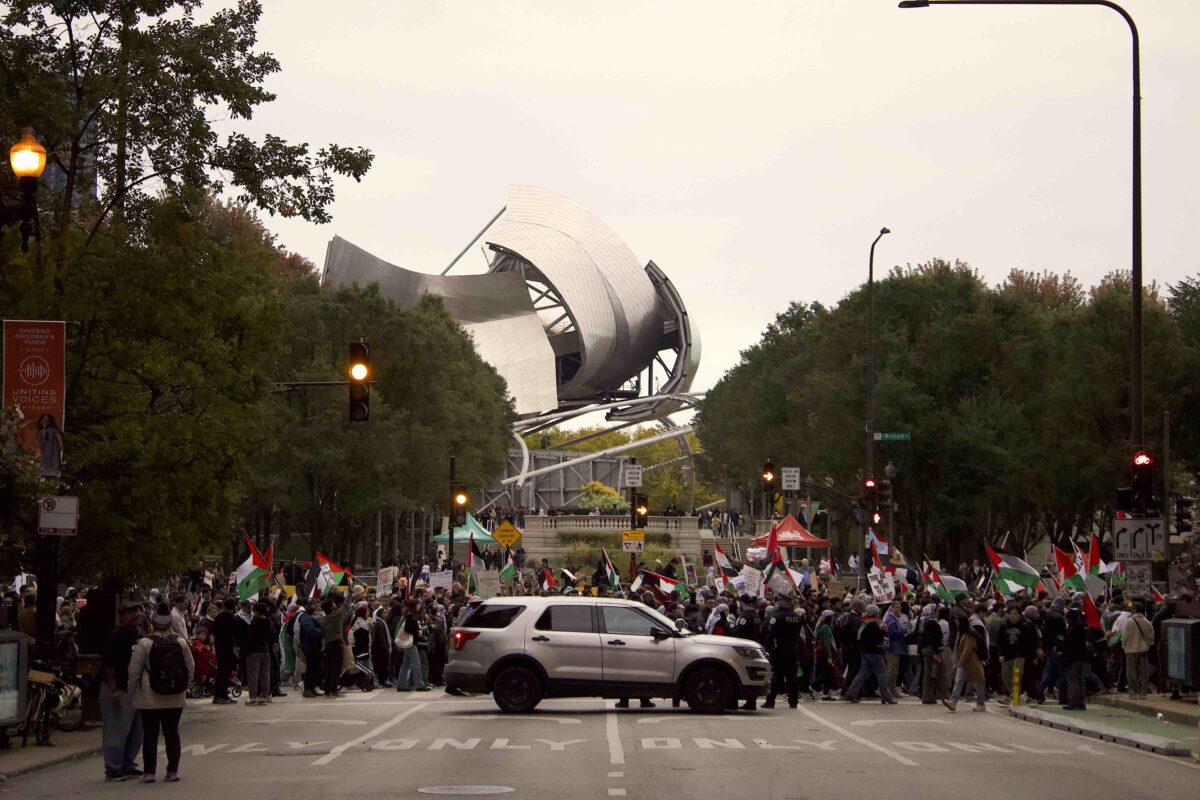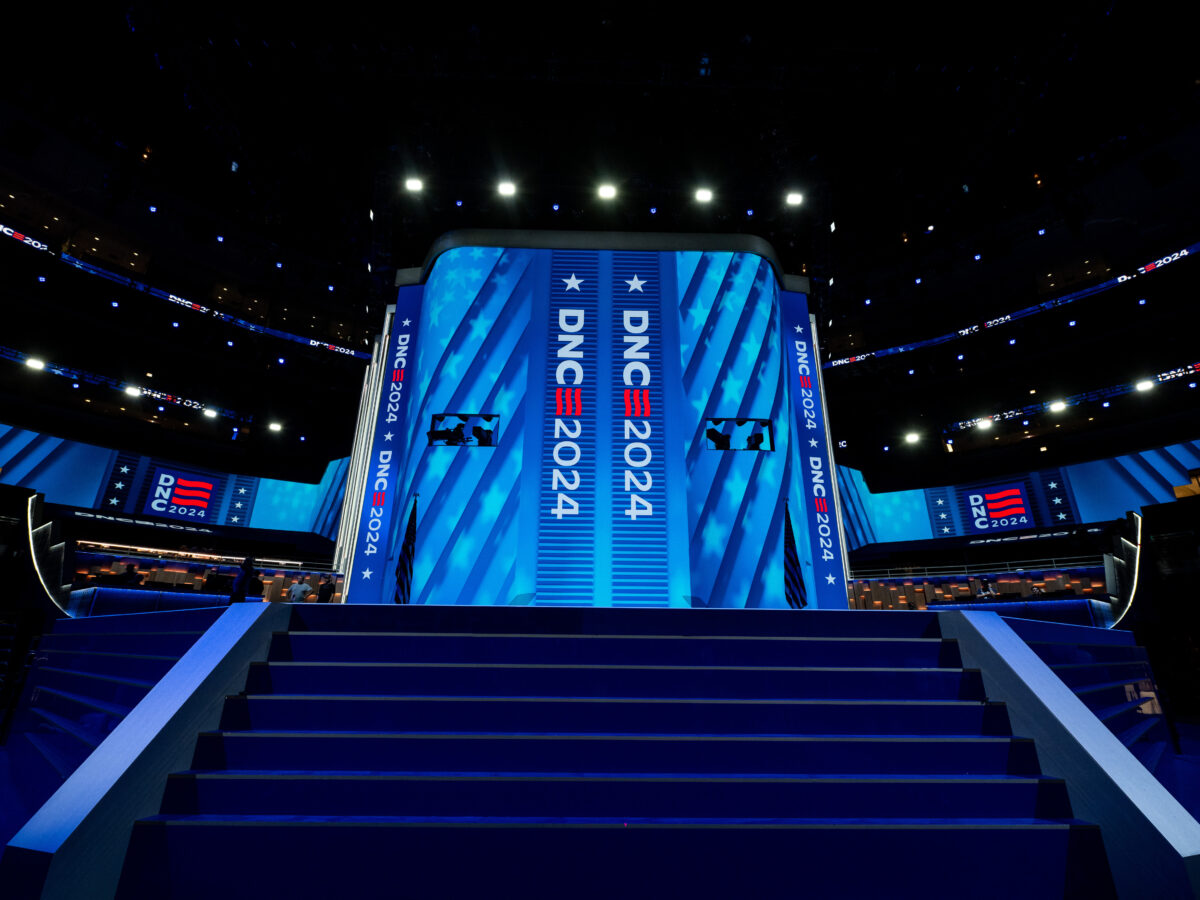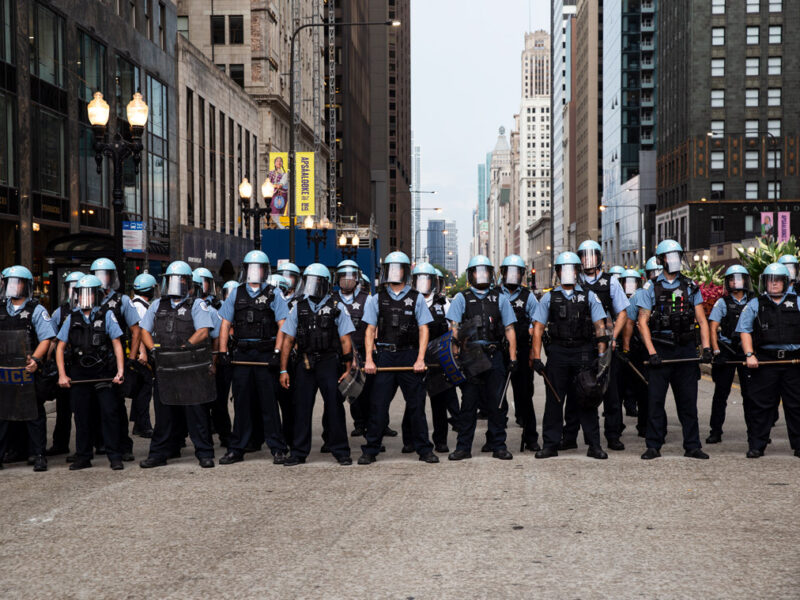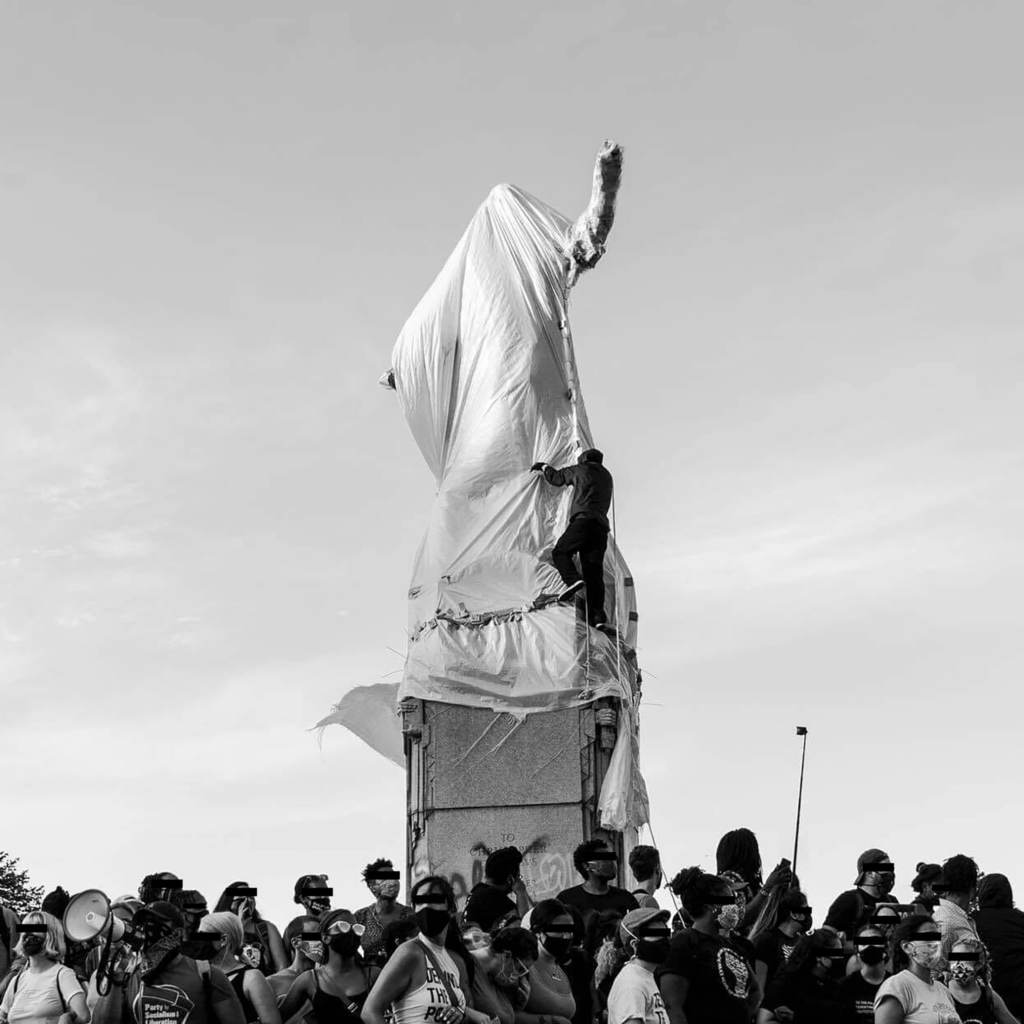Thousands are expected to march for a range of progressive causes at this year’s Democratic National Convention. We asked legal and medical experts how to stay safe and know your legal rights when protesting.
How should I prepare for a protest?
Always employ the buddy system while protesting. It’s also a good idea to have somebody on the outside who knows that you’re going to be protesting that day, according to Brad Thomson, an attorney with the People’s Law Office in Chicago. Make sure that person knows where you are and that they can help coordinate anything you might need at home, such as caring for loved ones or companion animals, if you’re arrested, he added.
What should I do if a police officer stops me?
“First and foremost, just remain calm,” said Ed Yohnka, the director of communications and public policy at the American Civil Liberties Union of Illinois. “Don’t argue, don’t resist, don’t obstruct police from doing things even if they’re violating someone else’s rights or yours.
“Point out that you’re not disrupting anyone else and you’re just there to express yourself. Always ask, ‘Am I free to go?’ If the officer says ‘yes,’ just walk away calmly. Don’t engage in any more conversation. The [less] said in that circumstance, the better.”
What should I do if I see an officer violating someone else’s rights or using excessive force?
Don’t intervene, since that could subject you to excessive force as well, Yohnka said. Start gathering as much information as possible: note precisely what time it is, where the arrest is taking place, and the officer’s badge number and physical description. Find witnesses and gather their contact information.
What happens if I get arrested?
“You have the right to ask why you’re being arrested,” Yohnka said, adding that you can ask “‘What is the circumstance? What’s the charge?’” While police may pat you down for a weapon, you should not consent to a search of your belongings or phone.
What should I say if I get arrested?
Ask for a lawyer and then exercise your right to remain silent. Don’t talk while you’re in police custody, since police could be listening. While police cannot listen to your conversations with a lawyer, they can listen to your calls with anyone else. If you call a loved one, keep the conversation short and simple: tell them you are safe and your location.
“You should be careful about what information you share and not talk about any of the facts about what happened or any of the underlying incident,” Thomson said. “That’s something that could again be used against you based on the fact that the police can be listening in and will be listening in to those calls if they’re not between [you and] an attorney.”
How do I call a lawyer?
The National Lawyers Guild will operate a legal support hotline 24/7 during the DNC.
You can call them at (872) 465-4244.
For arrests by Cook County or CPD, call Cook County public defender’s office arrest hotline, (844) 817-4448.
Write these numbers in permanent marker on your arm.
RELATED READING
Your Guide to the Democratic National Convention
I have prescription medication, will I have access to it if I get arrested?
If you’re arrested, inform police that you have medication on you that needs to be taken at a particular time, Thomson said. Keep that medication in its prescription container with your legal name on it, he added.
“If there’s additional ones that somebody else can hold on to, that’s another situation where having somebody on the outside can be helpful so that there’s medication that can be brought to the station,” Thomson said.
How should I mask up at protests?
COVID-19 levels are high in Illinois and cases have risen sharply over the last month, according to wastewater data from the Chicago Department of Public Health. Illinois isn’t alone. More than half of states across the U.S. are experiencing ‘very high’ levels of COVID due to the summer wave of infections.
To protect yourself and those around you from COVID, Dr. Andrew Noymer recommends an N95 mask or a KN95, which can be more comfortable. Though surgical masks may absorb some viral particles, they’re not snug enough to provide the tight fit that will prevent as many viruses and pathogens as an N95.
“I personally still prefer an N95 mask over anything else for the purpose of preventing COVID transmission,” said Noymer, an epidemiologist and an associate professor at the University of California Irvine’s Program in Public Health. “Tons of people are getting sick in July 2024 and I certainly recommend wearing masks in dense outdoor settings.”
What is CPD’s policy on masking?
Wearing a mask while protesting is not illegal, according to CPD. But the department’s policy leaves a lot of wiggle room for police officers to remove masks from protesters if they’re arrested.
“If a person taken into custody is wearing a protective mask, the mask will be removed for purposes of identification and photographing,” CPD spokesman Tom Ahern told South Side Weekly in an email. “It will be determined by the arresting officer and/or the detention officer whether the protective mask poses a safety risk to the arrestee.”
Should I use milk to rinse my eyes if I get pepper sprayed?
No. The American Academy of Ophthalmology does not recommend washing your eyes with milk because it is not sterile.
Water is the best way to decontaminate your eyes, according to Dr. Amit Gupta, an attending physician in the emergency department at Loyola Medicine. If you’re exposed to tear gas or mace, which are aerosolized chemicals, a diluted mix of 50 percent home vinegar and 50 percent water can help irrigate your eyes.
Pepper spray requires a different remedy since it contains a chemical called capsaicin, which causes burning.
“For pepper spray, which has some capsaicin, anything oil-based will be helpful,” Gupta said. “So the easiest thing that people have in their homes is usually like milk of magnesia or Maalox, like those antacid drinks can help.”
Should I wear my contact lenses to the protest?
If you think there may be a risk of police deploying pepper spray, you may not want to wear your contact lenses. “We always recommend against wearing contact lenses, as the contact lens can trap in the chemicals,” Gupta said.
Decontamination is the first step whenever you’re exposed to chemicals, so you’ll want to remove clothing, he added. “If you have contact lenses, especially if your hands have chemicals on it, you’re exposing yourself further, so it’s easier to have your eyeglasses.”
What kind of clothing should I wear at a protest?
If there is potential exposure to tear gas or mace, Gupta recommends long sleeves and long pants to keep your body covered. Running shoes are also a good idea.
With thousands expected to march and temperatures inching up toward the mid–to–high 70s this week, it’s also important to dress for the weather and protect yourself from the sun. Heat exhaustion can present itself in a number of different ways including feeling dizzy, light-headed or muscle aches, said Dr. Nicholas Cozzi, Emergency Medical Services and disaster medical director at Rush University Medical Center. Confusion is a particularly concerning sign of heat stroke, which can lead to seizures and cardiac arrest, he said.
What should I bring to eat or drink?
Stay hydrated with water and an electrolyte-based drink like Gatorade, Cozzi said.
“In terms of food, keep things simple: crackers or granola bars that don’t require a large amount of containers to transport,” he said.
What if I have to go to the ER?
“Having documentation of who you are is important, a next contact, if something were to happen,” Cozzi said. “Let’s say you were confused, experiencing heat stroke, [someone] could make a call to your loved ones.”
You might get separated from your bag, so have that contact information on your person, he added.
Leigh Giangreco is a freelance reporter based in Chicago. You can follow her work on Twitter @LeighGiangreco and at leighgiangreco.com.




